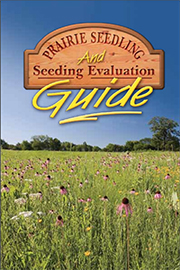For education-related questions email [email protected]
View a list of our 2026 Calendar of Events
2026 Native Plant Sources List (updated 2-7-26)
EDUCATIONAL LINKS
Follow the links below to find out more about your favorite native Michigan plants and related topics. Many are downloadable PDFs.
Gardening for Life by Doug-Tallamy
Basic Native Plant Terminology
Planning, Implementing and Maintaining a Native Garden
Getting Started with Native Plants MSU Extension
Great Lakes Tree Planting Guide pdf
Smart Gardening to Deter Deer MSU Extension
Invasive Asian Jumping Worms Fact Sheet pdf
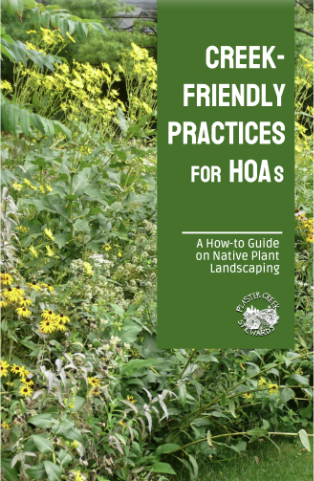
Creek-Friendly Practices for HOAs
A How-To Guide on Native Plant Landscaping (2025)
By Plaster Creek Stewards
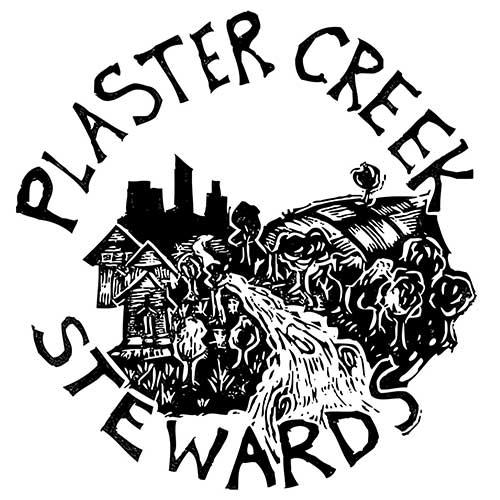

HOMEGROWN NATIONAL PARK® is a grassroots call-to-action to regenerate biodiversity and ecosystem function by planting native plants and creating new ecological networks.
Catalyzing a collective effort of individual homeowners, property owners, land managers, farmers, and anyone with some soil to plant in…to start a new HABITAT® by planting native plants and removing most invasive plants.
The initial goal is 20 million acres of native plantings in the U.S. This represents approximately ½ of the green lawns of privately-owned properties.
Homegrown National Park™ Let’s Get on the Map brochure pdf
Wild Ones River City challenges you to “GET ON THE MAP”
4 Universal Landscape Goals – By Doug Tallamy
For KIDS
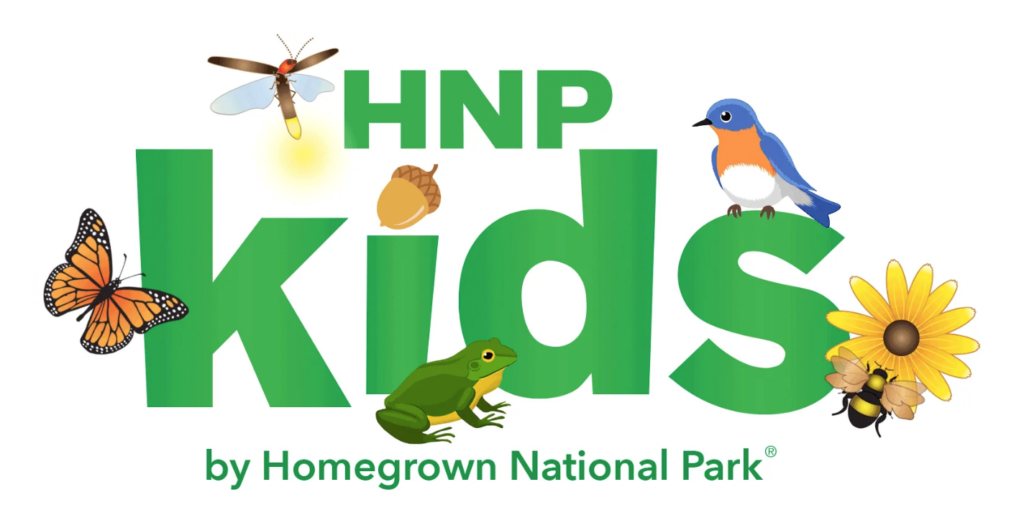
Homegrown National Park for Kids
A series of videos created for kids in grades K-2 by WonderGrove Kids, in collaboration with Homegrown National Park!
Free Native Plant Printables for Kids
by Little Puccoon Press
Download FREE native plant coloring pages, crossword puzzles, and word searches. DOWNLOAD
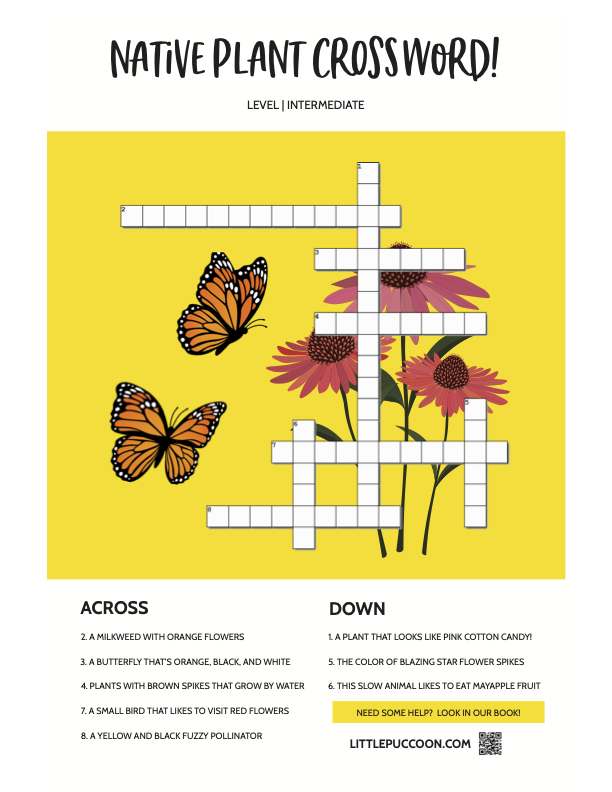
NATIVARS (Native Cultivars)

Revised Nativars-Statement from National Wild Ones (2021)
Download Wild Ones Nativar statement pdf
How Effective are Nativars? video with Doug Tallamy
Native versus Nativar: Whats the difference and does it matter, by Linda Shuster, WORC member
PLANT LISTS
Plants for Part Sun-Full Sun pdf
Native Shrubs and Trees for Backyard Biodiversity pdf
Black Walnut Tolerant Native Plants pdf
50 Plant Species Common to southern Lower Michigan (a starting point)
Monarch Nectar Plants Guide – Great Lakes Xerces Society
To read or download articles about specific species click here.
BOOKLIST
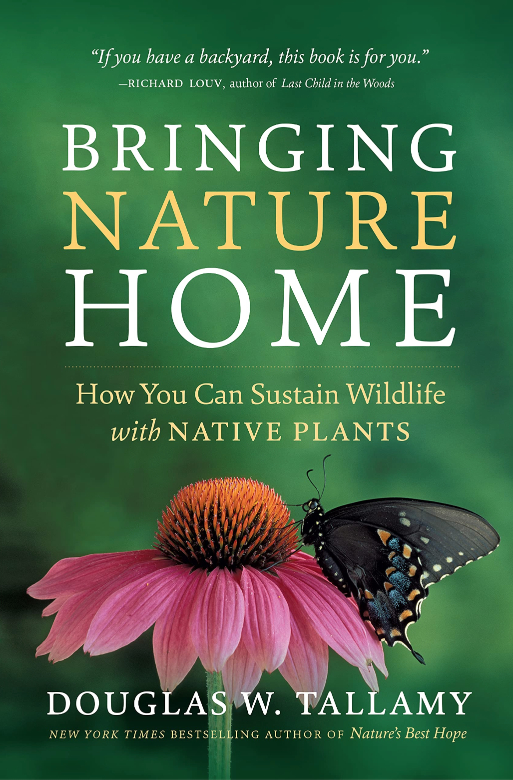
WORC Chapter’s Recommended Resources
An in-depth book list compiled by the WORC Chapter Education Committee that includes:
• a description of each book
• beginner or advanced level
• number of copies at Grand Rapids Public Library
• number of copies at Kent District Library
• download site/comments
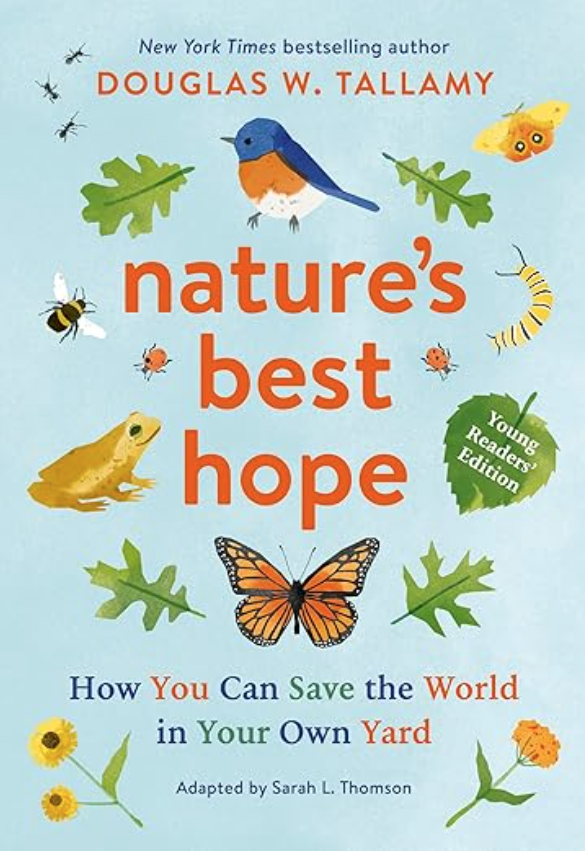
Nature’s Best Hope, Young Readers Edition Reader Discussion Guide downloadable pdf
VIDEOS
We have an extensive list of recorded webinar programs. View our video page.
Or watch on our YouTube channel @wildonesrivercity

NATIVE GARDEN DESIGN
A new Native Garden Design provided by the National Wild Ones was designed by two of our very own River City members—Amy Heilman and Rebecca Marquardt! Their plan is specifically designed for the Grand Rapids ecoregion. They and the designers for other cities were given the basic dimensions of the yard and foot print of the house and it was up to their imagination what the specifics would be.
Although the fictitious property is on an inland lake, it has many design elements that can be applied to various sites even if they are not on a lake. The general purpose of the plan was to show ways that homeowners can mitigate climate change issues, such as, retaining water on a property, improving soil structure, downsizing lawn, decreasing erosion, planting to create habitat, and arranging native plant communities that are suited to a specific set of growing conditions. Amy and Rebecca hope that people find some element of the design that will inspire them to adapt these ideas to their own properties. Download their entire design here. Read more about National Wild Ones free Native Design plans for other cities.
Grand Rapids Native Garden Design Video
Designers and Speakers: Amy Heilman, The Living Garden and Rebecca Marquardt, Revery
Hosted by Danielle Bell, Fall 2022
NATIVE PLANT SOURCING
- 2025 Wild Ones River City Native Plant Vendor List
- 2025 MI Native Plant Sources by Category
- Calvin University Ecosystem Preserve
- Kent Conservation District
- Plaster Creek Stewards
- Native Plant Guild
RAIN GARDENS
Comprehensive list of Native plants for Rain Gardens pdf
Wild One River City Video: Rain Gardens: Cleaning up the River, One Garden at a Time
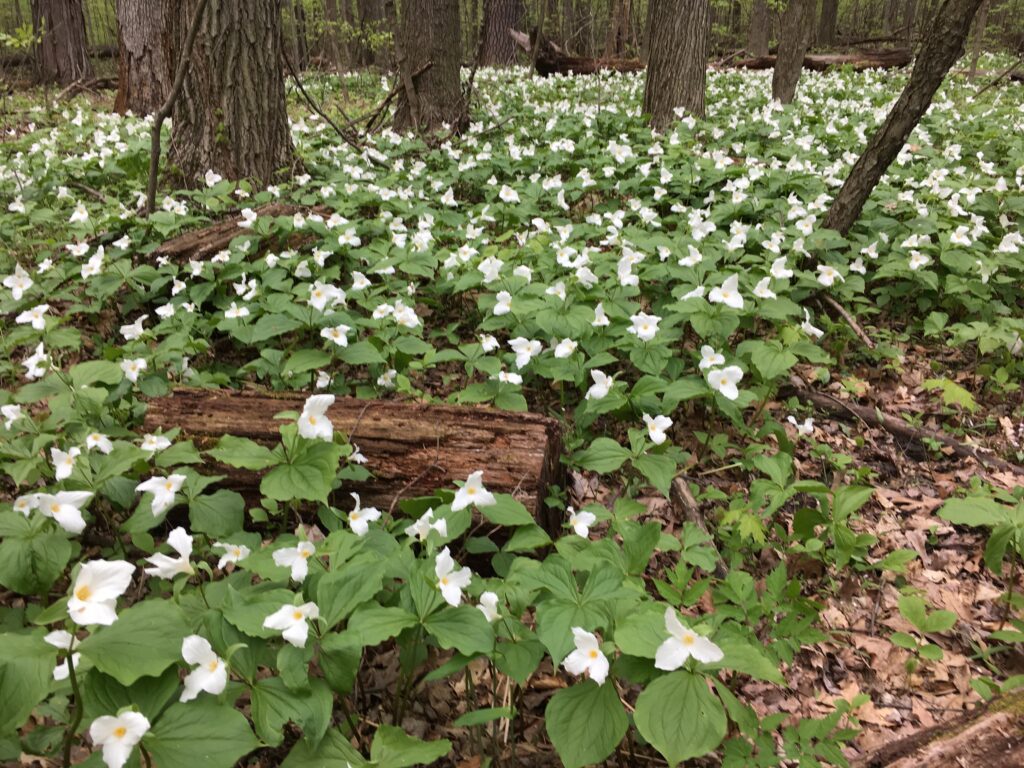
SPRING EPHEMERALS
Aman Park
Aman Park Images photo presentation of Spring ephemerals in the park
Guided Tour of Aman Park by William Martinus, botanist
Natural Features Inventory of Aman Park
History of Aman Park
by Kayne Ferrier, WORC Program Committee and retired librarian,
Grand Rapids Public Library
Hudsonville Nature Center
Hudsonville Nature Center Virtual Spring Ephemeral Hikes
videos by Craig Elston, Naturalist, Hudsonville Nature Center
Michigan Spring Woodland Wildflowers
NATIVE PLANT FINDERS
Audubon Native Plant Finder (enter zip code to do a search of native plants in your area and the birds attracted to them)
National Wildlife Federation Native Plant Finder (BETA) (enter zip code to do a search of native plants and the butterflies attracted to them based on the research of Dr. Doug Tallamy)
NATIVE SEEDS/PLANTING
Ten Steps to Successful Wildflower Planting – Michigan Wildflower Farm
Could you please tell me what native plants I can plant on the drain field?- MSU Extension
How to tastefully prairie a small garden bed.
Central Region Seedling ID guide for Native Prairie Plants
Seed Heads of Common Native Plants of the Tallgrass Prairie Charts with colored photos and collection Times. Izabella Redlinski, The Field Museum, Chicago IL
Winter Sowing in Milk Jugs
Photo by: Wild Ones Greater Cleveland
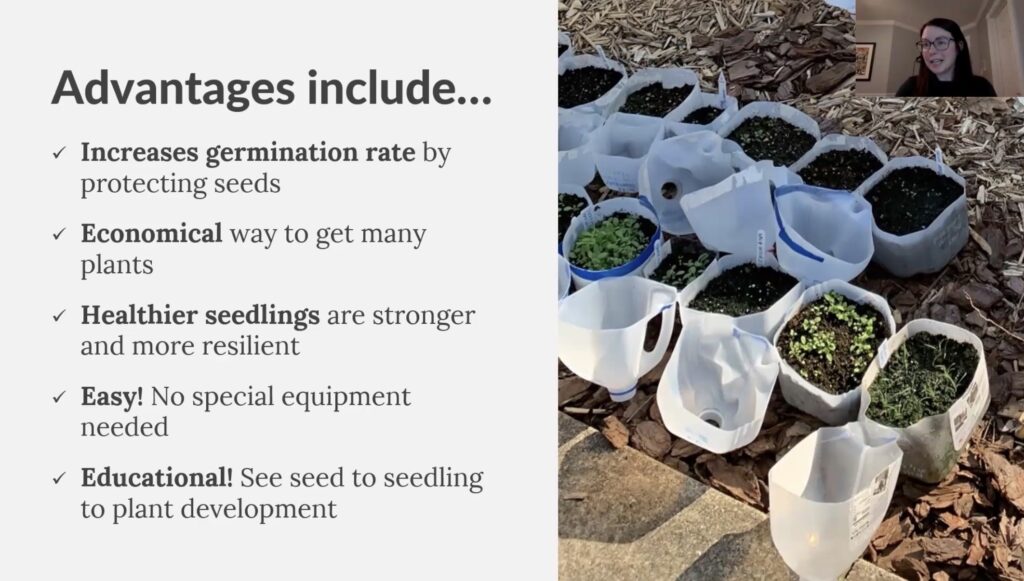
Seed Propagation – Prairie Nursery
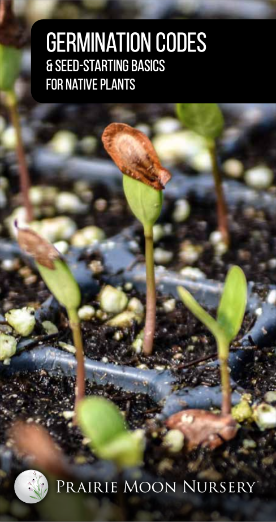
Germination Codes & Seed-Starting Basics
for Native Plants by Prairie Moon Nursery
Want to collect native plant seed for sowing this fall/winter? We’ve got the scoop! – Clean North
Seed Collecting – North American Native Plant Society
INSECTS & POLLINATION

Supporting Native Bees in Your backyard pdf
Powerpoint presentation by Jenna Walters, Phd Candidate, MSU for Wild Ones on August 21, 2023
7 Things you can do for Pollinators – Pollinator Partnership
POLLINATOR PLANT LISTS AND POSTERS by Heather Holm, author of Pollinators of Native Plants (a wealth of information—FREE to download for educational use).
Flower Flies – Pollinator Partnership
Bee Identification Guide – Pollinator Partnership

Attracting Beneficial Insects with Native Flowering Plants, MSU Extension
Keystone Native Plants for Pollinators – There are two types of keystone plants: Host plants that feed the young caterpillars of approximately 90% of butterflies and moths (Lepidoptera). Plants that feed specialist bees who only eat pollen from specific plants. Keystone plants for native bees feed both specialist and generalist bees.
Native Pants for Pollinators & Beneficial Insects: Great Lakes Xerces Society
Nesting and Overwintering Habitat for Pollinators and Beneficial Insects Guide
Plant Fact Sheets also with Attractiveness to Insects
Project Wingspan: Landscape Enhancement for Imperiled Pollinators of the Midwest
Save the Stems Brochure How to Create Habitat for Stem-Nesting Bees
Soft Landings: Diverse Native Plantings under Keystone Trees
Providing critical shelter and habitat for one or more life cycles stages of moths, butterflies, and beneficial insects.
MONARCH BUTTERFLIES
Monarch-Butterflies-Eastern-US-brochure
The Mystery of Milkweed Pollination by Dana Visalli
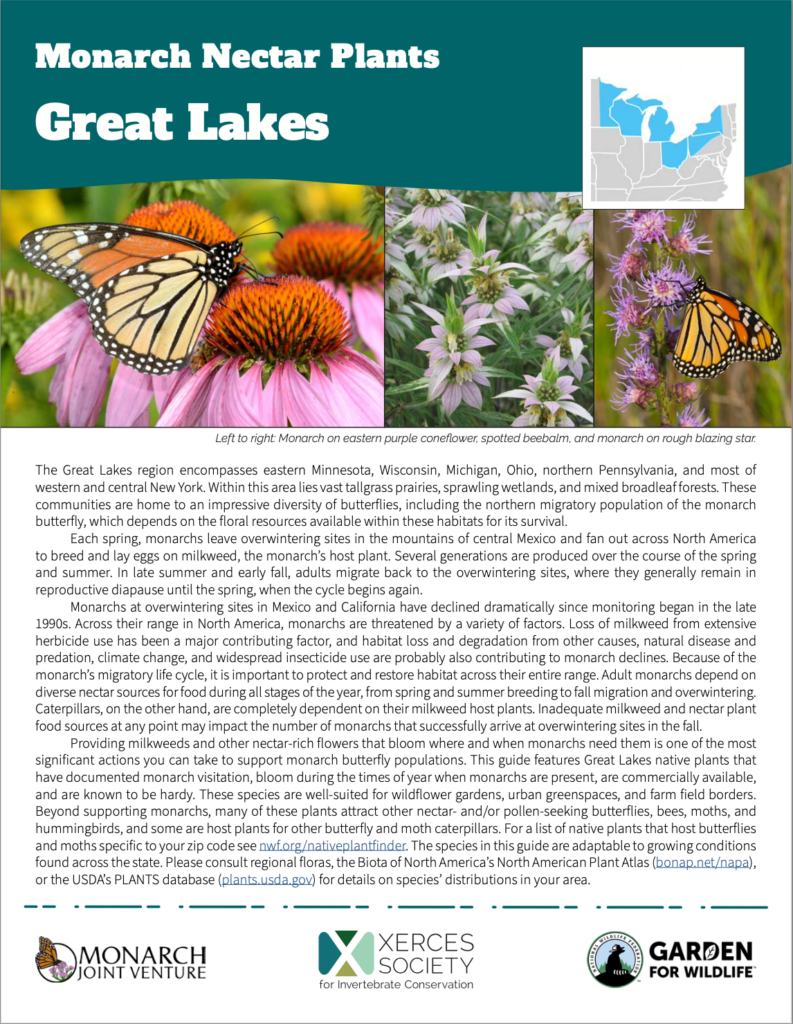
Monarch Nectar Plants Guide – Great Lakes Xerces Society
MOTHS
An Introduction to Moth Appreciation – Wild Ones River City YouTube video
Introduction to the Wonderful World of Moths
Moth Photographers Group
WILDLIFE HABITAT
Creating a Wildlife Habitat in Your Backyard
INVASIVE SPECIES
What are invasive species?
An invasive species is one that is not native and whose introduction causes harm, or is likely to cause harm to Michigan’s economy, environment, or human health.
Michigan Invasive Species Program Identify Invasive Species and Report
Invasive Plants
Invasive Insects
Invasive Worms
Asian Jumping Worms Fact Sheet
NATIVE PLANTS & BIRDS

Audubon Plants for Birds
Bring birds to your home by growing native plants. With Audubon’s Native Plant Database, you can find the best plants for the birds in your area. Growing bird-friendly plants will attract and protect the birds you love while making your space beautiful, easy to care for, and better for the environment. Explore all of our native plant resources here, including our factsheets on creating a native plant garden and how it can save you money.

Plant Trees that Turn Your Yard Into a Bird Oasis—and Carbon Sponge
Article by Janet Marinelli, audubon.org
Trees create habitat and store CO2 for decades to come. Just pick carefully.
Article: A Yard Full Of Native Plants Is A Yard Full Of Well-Fed Birds, By Kathi Borgmann, Cornell Lab 02/27/2018

Article: The Birds Thank You for Native Plants by Wild Ones member, Joyce Tuharsky 02/01/26

The mission of Saving Birds Thru Habitat is to protect, enhance and restore habitat for North American birds and to educate people of all ages about this important mission and how to achieve it. Their goal is to improve habitat for migrating birds one backyard at a time.
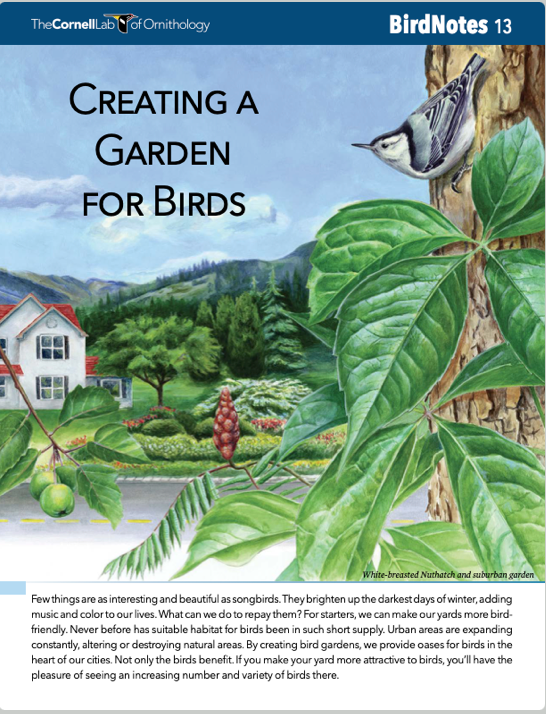
Creating a Garden for Birds
Birdnotes 13, The Cornell Lab of Ornithology
IDENTIFICATION Plants, Insects & Birds
- Michigan Flora Online
- Michigan Natural Features Inventory
- USDA Plants Database
- The Biota of North America Program (BONAP)
- Lady Bird Johnson Wildflower Center
- NE US Flower, Tree, & Bird ID
- What Tree Is It?
- Basic Guide to Tree Identification
- Seek App by iNaturalist
- All About Bugs Guide
- Cornell “Merlin Bird ID” App
- Wildlife In the Strangest Places
- Monarch Butterfly Information
NATIVE PLANT VIEWING
 Aman Park
Aman Park- Blandford Nature Center
- Calvin College Ecosystem Preserve
- Friendship Park, Kent District Library, Cascade Branch
- Hudsonville Nature Center
- Native Plant Education Garden – Wild Ones River City
- Pierce Cedar Creek Institute
- Saul Lake Bog Nature Preserve
- The Highlands – Grand Rapids
- Wittenback Wege Center – Lowell
- Eight Mid-Atlantic gardens that showcase native plants – The Washington Post
OUTREACH
- Groundswell
- Kent Conservation District
- Land Conservancy of West Michigan
- Michigan Botanical Club
- Michigan Invasive Species Coalition
- Midwest Invasive Plant Network
- National Wildlife Federation Certification
- North American Native Plant Society
- The Aldo Leopold Foundation
- The Stewardship Network
- Trout Unlimited
- West Michigan Conservation Network
- West Michigan Environmental Action Council
- Wildflower Association of Michigan
INTEGRATED PEST MANAGEMENT (IPM)
SOURCES FOR PLANT PHOTOGRAPHY, CHARTS, ETC.

Leaf chart by Jerry Jenkins,
Northern Forest Atlas
- The Northern Forest Atlas produces graphic tools for naturalists and ecologists. Their site contains photographic and digital images, diagrams, videos, and illustrated articles. Books, Guides, Charts, and digital products are available for purchase or free download in the Products section. Visit Northernforestatlas.org.
- Forestry Images provides free plant images (must attribute the photographer) provides an easily accessible archive of high quality images for use in educational applications. Visit forestryimages.org.
GREEN INFRASTRUCTURE
Green Infrastructure 101 video
Green Infrastructure in Grand Rapids, MI
Rain garden at Parkside Elementary in Rockford, MI video
Ever wondered where the rain goes? Sustainable drainage animation



